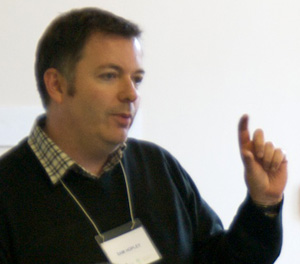Sam Hopley – CEO, Timebanking UK
 Timebanking UK nationally has about 20,000 members across 220 timebanks, of which Newsome is an important one. At the moment about 2 or 3 timebanks spring up each week.
Timebanking UK nationally has about 20,000 members across 220 timebanks, of which Newsome is an important one. At the moment about 2 or 3 timebanks spring up each week.
We are part of a growing Timebanking family. It’s fascinating that at this time people all over the country, the world even, are coming up with similar solutions to the problems that we face and if we can connect up that learning the potential is unlimited.
Timebanking redefines how we relate to each other. “Marginalised people” are labeled and isolated by the services they use which then work to overcome the isolation they helped create.
Holy Cross Centre in Camden is a day service for people with mental health problems. When I started working there six years ago, we had no money, one manager, twelve staff and were trying to meet the needs of 500 people. It was impossible. It might sound strange coming from a professional – an “expert” – but I had no idea what I was doing. We were 12 staff trying to meet the needs of 500. We never had enough money. How do you ever have enough money to meet the needs of 500 people? So we became rationers of resources.
What I did have was an army. 500 people is an army, but they were 500 people who had never been asked to do anything before.
Partly, timebanking is a tool for co-production without the co-production, without handing over the decision making, without handing over the power, without this being about local people coming up with local solutions, there’s not really much point to timebanking. Volunteering is already pretty good. There is a real role for volunteering, but there’s also a real role for people to take control over their neighbourhoods and their lives.
Six years into Holy Cross Trust we now have 1,200 co-producers. We went on a journey from being that building where those people go, to being a community resource. We started by using timebanking for exchanges between organisations and what it meant was we could start to break out of our own little networks. What timebanking can do where we have lots of closed circles of trust – such as a church, a pub, a place of work, a family or a group of friends – is to let those closed circles relax and open up to each other.
Timebanking says everybody has something to offer and it’s equal. It’s a simple equation: an hour equals an hour. I think we’re in the middle of a new way of doing things. I don’t think anyone knows how it will unravel. We’re in the process of trying to understand what the implications of building social capital actually looks like and what it’s going to mean, and we yet don’t know.
There is a division here.
Do we believe people can and will, given conditions of fairness and an environment of opportunity? Or do we think that people need controlling and shaping and telling and restricting? I can only say what environment and what approach has been best for me.
I recognise that in my life I’ve been in the right place at right time. I’m no better or cleverer than anybody else but along the way I’ve often met somebody that could help me or introduced me to somebody who could. We’ve created a system that has removed a whole sector of people from ever being part of those opportunities, from ever being in the right place at the right time.
What timebanking is about is re-establishing that sort of connection.

